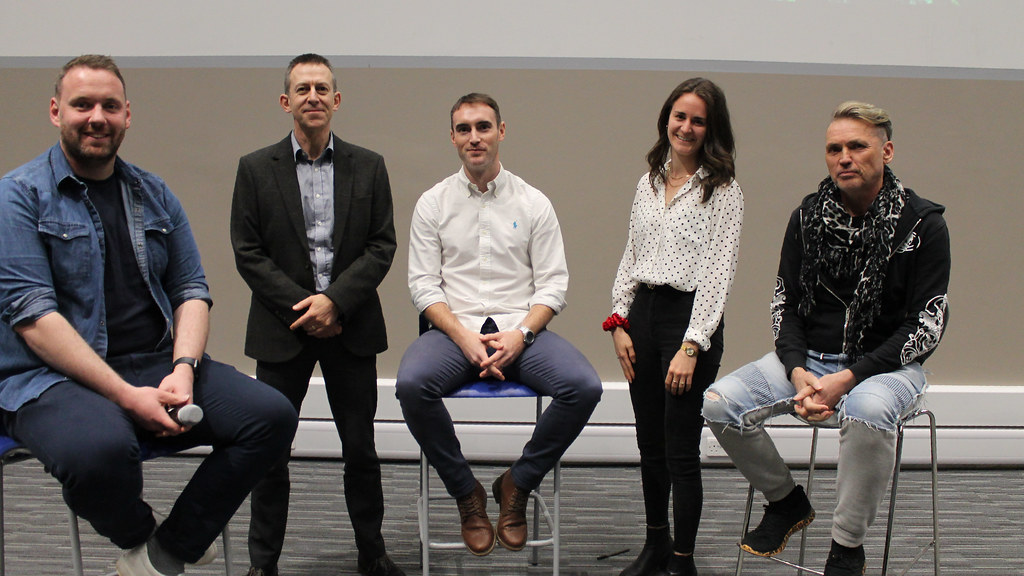Students and staff heard from Dale Vince OBE (CEO of Ecotricity and owner of Forest Green Rovers F.C.), and Rich Hughes (Director of Football) at a recent in-person event on campus focusing on sport and sustainability.
Across a wide-ranging discussion chaired by Dr Darragh McGee from the Department for Health, Dale spoke about his journey from CEO at Ecotricity to owner of Forest Green (FGR), which was recently named the world’s greenest club by FIFA, and the world’s first carbon-neutral club by the UN.
His arrival at the club in 2010 came at a time when FGR was on the verge of bankruptcy and relegation. As a football fan, investment in the club, which was a key part of the local community where he lived, was an attractive prospect.
Yet, on day one he found that red meat was being served to players and in the weeks and months ahead he realised there was much of the club that had to be changed in order to bring it into alignment with the principles of Ecotricity when it came to the environment.
“I realised that, in effect, we’d be building a new football club, a green football club, and that we’d also be taking our message on the environment to a stereotypically very difficult audience. We wouldn’t be preaching to the choir; and that made it more appealing to me,” he said.
Describing the club’s decision to go vegan – dubbed at the time by The Sun as ‘The red meat ban’ – Dale and Rich explained how this had been phased in over several seasons and how uptake an acceptance has been exceptionally high.
The players have been the easiest audience, they said, and the introduction of plant-based diets has had important performance benefits for them including a reduction in soft-tissue injuries. But fans are increasingly changing their habits and their diets too.
“There’s almost no game that goes by when a fan doesn’t come up to me to say they’ve gone vegetarian or vegan,” said Dale. “The fans have really embraced it.”
Audience questions asked about the potential challenges between the club’s sustainability principles and the modern nature of football, most notably international travel and flying. Whilst this raises potential conflicts, Dale and Rich believe there are ways around this. For example, an invite for FGR’s Academy team to train in Spain has been navigated by opting for the train over the plane.
“We won’t be flying. Our message all the time is that flying is unnecessary and to send our lads to Spain for a couple of weeks would undo everything, apart from the fact that it’s just wrong”, Dale said. The opportunity of slower travel via France would offer the young team a more rounded experience, said Rich Hughes, including a planned trip to the Nou Camp in Barcelona en route to the tournament.
From food to flying, environmentalism has been embedded into FGR’s DNA, which has also created a unique selling point for the club. This has had positive knock-on impacts both in recruiting players and finding new sponsorship opportunities. Citing a three-fold increase in sponsorship, Dale explained how “principles might look like they cost you money, but actually quite often they don’t.”
Most recently the club announced its plans to move location and build a new stadium made entirely from sustainable materials. The proposed FGR ‘wooden stadium’ will be a world-first in construction. Its design stems from the fact that 75% of all stadia carbon footprint comes from materials used in their construction which are embedded from day one.
Commenting on the event, Dr Darragh McGee said: “What Dale Vince and Forest Green Rovers have achieved is a pioneering example of collective action towards a greener, more sustainable model for elite sport. And yet, as Dale so powerfully expressed, the urgency of the climate crisis means that so much more needs to be done on a global scale. I’m thankful to Forest Green and very proud of the student engagement with the event. Hopefully it can add to the momentum for change at the University and beyond."
University of Bath sport and social sciences student Maria Cundale, who introduced the talk as chair of People and Planet added: “As the IPCC publishes yet another alarming report on the climate crisis, the urgency of the issue is clear. To summarise: the time to act is now or never. Yet, amidst this, the sports sector seems to take minimum responsibility. The 2022 Beijing Winter Olympic Games were hosted using 100% artificial snow, the FIFA Qatar World Cup had initial plans for air-conditioned stadiums, and teams fly around the world emitting more carbon than we can afford.
"Dale Vince from Forest Green Rovers brought a ray of hope for sustainability in football and sports more generally. During his exchange, we heard him discuss how zero- and low-carbon emitting practices can be embedded within sport, and why clubs must take immediate and urgent action for the climate. His powerful message was heard by staff and students alike, whom I hope will turn words to action, in both their personal and professional lives."

